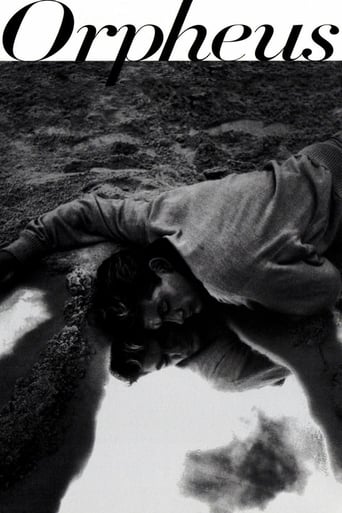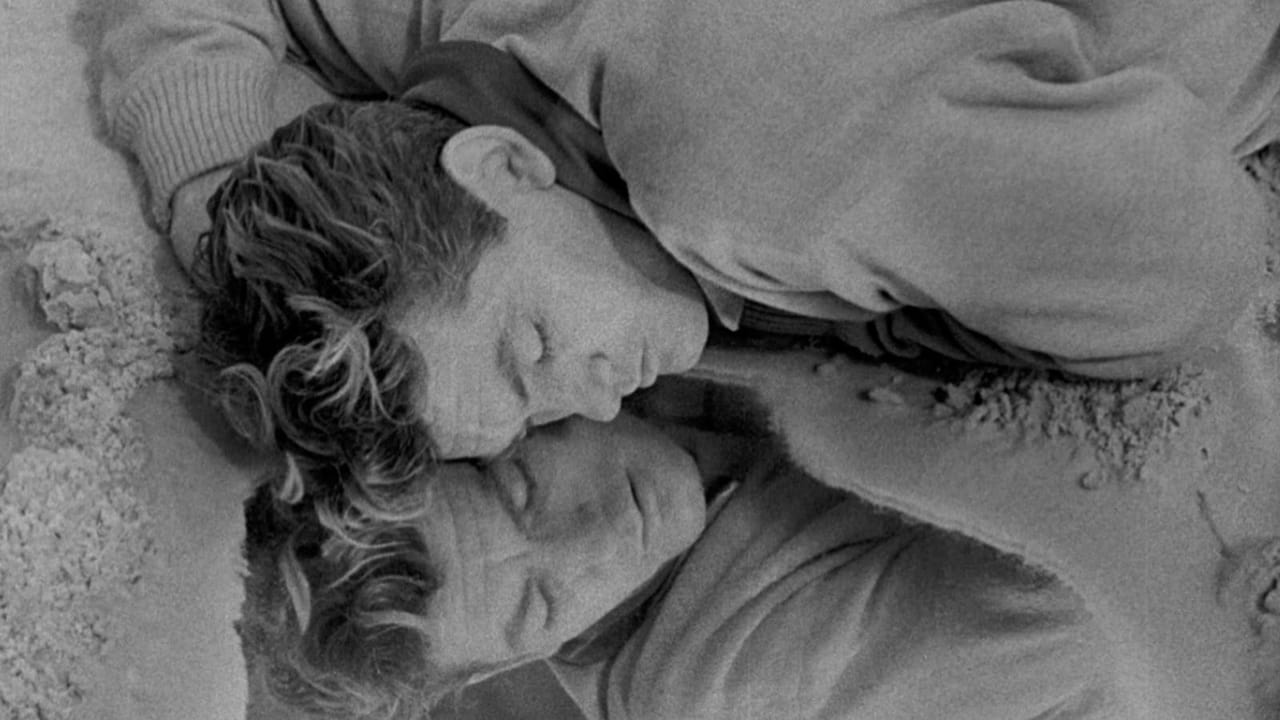StrictlyConfidential
Do you wanna hear something so utterly demented that it's downright laughable?In this updated tale about the myth of Orpheus there exists a truly idiotic subplot.And, it goes like this - There's a large group of snobbish, young adult poets (and poet wannabes) who are so irrationally emotional about poetry that (when they collectively decide to hate another's poems) they will actually gather in packs and (get this!) resort to hostility and violence against the poet-outcast.Ha! Isn't that a laughable scream?..... And, on top of this truly goofy subplot - This 1950, French production was all pretty dreary stuff to me.Not only was Orpheus' story told in the driest and flattest fashion imaginable - But its total lack of visual imagination (where I couldn't tell the diff between the "Land of the Living" and the "Land of the Dead") left me completely unmoved.Yep. Orpheus was yet another French production that was full of promise, but it couldn't deliver.
Jackson Booth-Millard
From director Jean Cocteau (La Belle Et La Bête), I had no idea what this film from the book 1001 Movies You Must See Before You Die would involve, I may have read a little about it before watching, but I just decided to watch it and make my judgements afterwards. Basically, set in modern day Paris, it is the contemporary story of the Greek god Orpheus, in this case a famous poet named Orphée, or Orpheus (Jean Marais), and it starts with the death of rival poet Jacques Cégeste (Edouard Dermithe) during a brawl with Death itself, i.e. the Princess (María Casares), and he is taken as witness with the body in her car. They go to a château and he listens to some seemingly meaningless but in fact interesting messages on the radio, and Orphée becomes obsessed with the Princess, despite the fact that he is already married to Eurydice (Marie Déa), who is killed by the Princess's henchmen. He finds this out and goes to search for her in the Underworld, but he cannot look at her otherwise she will die, and in the end this may all have been a dream and Eurydice may actually be alive and pregnant. Also starring Henri Crémieux as The Editor, Juliette Gréco as Aglaonice, Roger Blin as The Writer and Pierre Bertin as The Inspector. I will be honest, it was a bit complicated that I can't really confirm all the facts about the story, but I did like the twist taking an ancient story and bringing it into the modern world, and there were some clever sequences and images, such as the mirror that is a portal to the other world, it's a worthwhile fantasy. It was nominated the BAFTA for Best Film from any Source. Very good!
pontifikator
Jean Cocteau's heartbreaking story of love and longing is based on the Greek myth of Orpheus and Eurydice updated to 1950, when the film was made.Cocteau favorite Jean Marais plays the title role, Marie Dea plays his wife (Eurydice), and Maria Casares plays his death. Cocteau was a brilliant filmmaker and screenwriter, and he chose his subjects well. See the paragraph below* for a summary of the ancient myth on which the film is based.In 1950, Orpheus is a poet who has no following. He accepts a ride from a princess and listens to the radio in her car. During World War II, many people used broadcast radio to send coded messages to underground cohorts or spies in other lands. The princess's radio picks these up, and Orpheus transcribes them as his poetry, to great initial success. Things take a turn for the worse, though, as he's charged with plagiarism and the princess sends Eurydice to the underworld before Eurydice's time on earth was up. The princess is death, and her premature action leads to consternation in the underworld, giving Orpheus the opportunity to plead his case for the return of Eurydice.A poet of considerable talent himself, Cocteau uses "Orpheus" to examine creativity, bureaucracy, and remorse. In his youth, Orpheus was a national hero for his poetry, but he's older now, and the young poets are replacing him with blank pages - absurdity for its own sake is better than being thought absurd for what you've written. Cocteau was 60 when he wrote and directed this film, and he could look back on fame and its ephemerality with more equanimity than his character Orpheus could.Cocteau creates a remarkable array of special effects for Orpheus's trip below. Without computers and without much in the way of trick photography, Cocteau manages to persuade us that Orpheus can pass through mirrors and walk backwards through the underground passages. As with "Beauty and the Beast," the effects are the servant of their master, adding to the story, never overpowering it, never intruding. The princess's costumes are amazing. The costumes of the motorcyclists that are her outriders are fairly accurate renderings of motorcycle police uniforms, but they mirror her waist-cinched gowns very effectively. Watch the changes in her gown as she becomes infatuated with Orpheus and comes and goes through the mirror-portals. Cocteau was such a genius, as was his costumer, Marcel Escoffier.As in the myth, death is overcome by love. When death becomes passionate for Orpheus, she knows for the first time the meaning of love, longing, anger, and remorse. She acts for the first time on her own accord, to have Eurydice die so the princess can have Orpheus. The gods are taken aback that death would act without their authority, and they reverse her decision, returning Eurydice to life. Heurtebise, death's chauffeur, has fallen in love with Eurydice, but still he follows death's command and returns to the couple to life at the time of their greatest happiness. The sacrifice of the princess and her chauffeur (played by Francois Perier) is unexpected, and the resulting happiness of Orpheus and Eurydice is heartbreaking when witnessed through the Heurtebise's eyes. Georges Auric's score is spare, but majestic. You can hear some of it in this YouTube clip: http://www.youtube.com/watch?v=91cniSsNwz8 and watch some of Cocteau's effects as Heurtebise takes Orpheus back to the real world. I would contrast Auric's use of percussion with Bernard Herrmann's snare drums in "Taxi Driver." In both films, the music is an integral part of the story.Cocteau comes as close as any soundfilm director to the beauty of cinematography in silent films. "Orpheus" is a beautiful film.*In Greek myth, Orpheus was the son of Apollo and Calliope (the most gifted of the nine Muses) and a gifted poet and musician. The Greeks rhapsodized about his powers with song and lyre, and I recommend reading some of their myths about Orpheus. When his wife, Eurydice, died, Orpheus played and sang so sadly that the gods wept and allowed him to go to the underworld and beg Hades for her return. His songful wish was granted (Hades himself being reduced to tears), but as ever there was a catch. Eurydice was to follow him, and if he turned to see if she were there she would be swept back to the underworld. (Do you trust your gods?) Of course he couldn't stand it and looked to see if she were there. (What is it about us mortals that we can't follow clear directions and not look back? Story at 11:00 by our senior correspondent, Lot's wife.) There are variations on the story (Greek myths changed with the times and needs of its peoples). In some stories she vanished forever, leaving him bereft. In others, the gods won Eurydice's partial release for six months - giving us spring and summer when she returns to the surface, then fall and winter upon her descent. It's a wonderful story and well worth searching out. And if you've ever been to The Orpheum, now you know the origin of the name.
cheshire551225800
Very few films can hold up after nearly 60 years. Yes, in America here we have The Wizard of Oz and Gone With the Wind (big budget epics) etc. but this film should get some mainstream TV viewing as well, although it won't. American viewers don't like subtitles, at least PBS should show it.I've watched some of the classics like "M", "From The Earth to the Moon", "Metropolis" etc. and for the most part they don't hold up. Metropolis does, but that is because of the crazy cool visuals. Jean Cocteau's Beauty and the Beast and Orpheus both hold up very well.They are both so beautiful and magical that you don't care if they are old or done with outdated technology. Cocteau was a genius of the first order and his art still stands the test of time. To watch a movie like Orpheus and stll be shocked at what happens is a testament to his ability to go for the strange, especially from someone like me who has seen plenty of jaded movies which were meant to be shocking but were merely outre'.See Orpheus (and rent Beauty and the Beast while you are at it) and have a Cocteau Fest, you won't reget it.


 AD
AD





